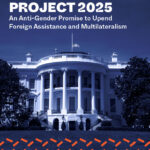
This report focuses on the damage Project 2025 would have on overseas development assistance and international cooperation.
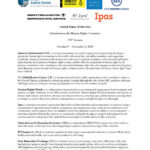
On October 17-18, 2023, the United Nations Human Rights Committee reviews U.S. compliance with the ICCPR, including the impact of Dobbs on its human rights obligations. Global Justice Center, State Innovation Exchange, Amnesty International, Ipas, Human Rights Watch, RH Impact, and Obstetricians for Reproductive Justice submitted this report to the Committee that details the human rights violations caused by Dobbs in the U.S.
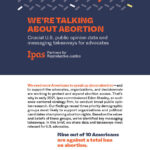
We need more Americans to speak up about abortion—and to support the advocates, organizations, and decisionmakers working to protect and expand abortion access. That’s why Ipas worked with Eden Stanley, an audience-centered firm, to conduct broad public opinion research. Our findings reveal three priority demographic groups most likely to support organizations and political candidates championing abortion rights. Based on the values and beliefs of these groups, we’ve identified key messaging takeaways. In this brief, we share data and takeaways most relevant for U.S. advocates.
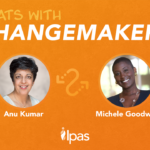
A thought-provoking conversation between Ipas President and CEO Anu Kumar and award-winning author, advocate, professor and social commentator Michele Goodwin.
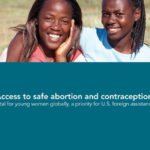
The United States, as the world’s foreign assistance leader, must play a key role in safeguarding a comprehensive and integrated approach to sexual and reproductive health and rights for young women. This fact sheet outlines policy challenges that deny young women their sexual and reproductive rights and puts forth policy actions the U.S. government should take: expand family planning funding, repeal the damaging Helms Amendment, permanently repeal the Mexico City Policy (also called the Global Gag Rule), and continue to work toward a progressive sexual and reproductive health agenda in platforms like the International Conference on Population and Development and the United Nations.
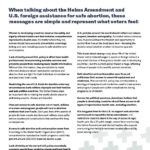
When talking about the Helms Amendment and U.S. foreign assistance for safe abortion, these key messages are simple and represent what voters feel, according to 2020 polling results.
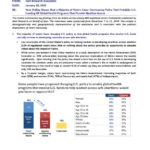
This memo summarizes key findings from an online survey among 800 registered voters nationwide conducted by Hart Research on behalf of Ipas.
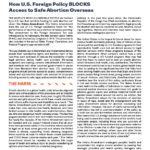
This factsheet provides an overview of the Helms Amendment and how it harms the world’s most vulnerable women by denying them access to safe abortion services.
In a state where access to contraception, abortion and other reproductive health care is already hard to get, how likely are women to get that care in the wake of Hurricane Harvey?
The domestic and global gag rules stigmatize a simple medical procedure by disconnecting it from other health care services and by forcing doctors not to offer women the whole array or reproductive options available to them.
More than half the population supports gay marriage and families. So when will abortion and women’s rights to reproductive self-determination be a cultural norm?
The stigma that often surrounds abortion and anyone associated with it—women, providers, pharmacists and advocates—contributes to abortion’s social, medical and legal marginalization. At Ipas, we know that stigmatizing abortion is inherently harmful to women’s health — preventing them from getting the care they deserve.
The new WHO recommendations make it painfully clear that, nearly 40 years after Roe v. Wade, we’re doing everything wrong here. Whether it’s gestational limits, ultrasounds, counseling or human rights, nearly every policy proposed by anti-abortion legislators directly contradicts the new WHO guidelines, which are based on years of consultation and discussion, incorporating scientific evidence and international human rights standards.
At a time when the pool of abortion providers is shrinking and abortion clinics are closing, medical abortion can truly increase women’s access, particularly to those in underserved areas. For legislators who want to end access to abortion under any circumstances, medical abortion is an obvious target.
Two major women’s health organizations, Susan G. Komen for the Cure and Planned Parenthood, battled for women’s respect and donations. Two days later the dust is settling and we’re left to wonder what we should take away from the tangle? Was it about fundraising? Women’s health? Politics? I suggest it is about stigma, specifically abortion stigma that has been deliberately attached to a beloved national institution and household name, Planned Parenthood.
- 1
- 2


